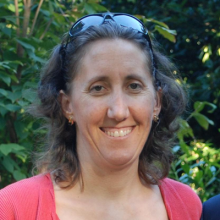For Dr. Delia Heck, students have always come first. Currently serving in three positions at Ferrum College–Associate Professor of Environmental Science, Chair of the Faculty Council, and as Coordinator of the Quality Enhancement Plan – balancing so many roles hasn’t lessened her dedication to her students.
Ferrum College is located in rural Appalachian Virginia, where Delia nurtures her students’ intellectual and technical growth by offering hands-on approaches to learning. She also partners with the Smith Mountain Lake Association, which allows her students to participate in fieldwork in water quality monitoring: testing for bacteria, pollution, and so on. This 27-year Ferrum College environmental initiative, which Dr. Heck has been involved for the last seven years, is focused on maintaining the quality of Smith Mountain Lake. She is currently the Associate Director of the Smith Mountain Lake Water Quality Monitoring Program. Students pair this experience with intellectual exposure across the social sciences, including geography, sociology, political science, and environmental policy, seeing how different disciplines approach questions.
When asked what she remembers most about her experience at the University of Washington, Delia is eager to sing the praises of faculty and her graduate student colleagues. She completed her PhD in 1996. Her dissertation focused on Western involvement in the oil industry in Western Siberia. “I looked at the role of joint ventures in facilitating technology transfer and how the process of industrial change at the regional, national and international levels was impacting the oil industry and those ventures,” she said. As an undergraduate student juggling multiple offers for graduate work, her adviser encouraged her to attend UW because of the faculty’s reputation as both intellectually engaging and amicable. Delia’s experience reflected that, as she could exchange ideas with faculty even when at informal events. She noted that they invest not just in their advisee’s intellectual growth, but also in their lives. She considers this invaluable time to be one of the best things she’s ever done, pointing to the freedom it’s provided her to explore new ideas and to reflect on the geographic process.
Delia’s path to her current position has taken several detours along the way. After finishing her doctoral research on energy economics and policy, which focused on Western technology transfer to post-Soviet Siberia, Delia worked for a consultant in Arizona. While there she married her partner, an Episcopal Priest, and they were both offered positions in Ferrum, VA. This was all the more exciting because it would allow Delia to concentrate her career on her passion: teaching. Her 17 years there have been productive in helping students learn how to conduct research, which has served them well in diverse careers in academia and in the public and private sectors.
